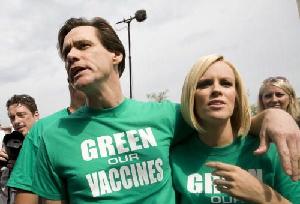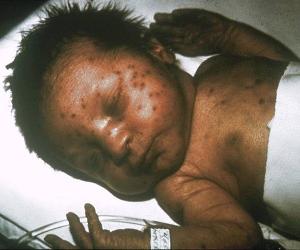Vaccines and Autism
 | | Carrey and McCarthy |
Almost two weeks ago, Jenny McCarthy and Jim Carrey lead a rally on Washington—“Green Our Vaccines”—in which they tried to raise awareness about the purported link between childhood immunization regimens and autism. As a father-to-be, I felt it my responsibility to check up on this subject and get the facts, as the matter is a deathly serious one.
On one hand is autism, a neurological issue I researched pretty extensively for my novel Thesea. It is a sad and highly debilitating disorder, and a heartbreaking one for parents. In all honesty, my heart goes out to McCarthy and the millions of other parents out there who have had to cope with the challenges of having an autistic child. If there is a link between vaccinations and autism—and one that can be fixed by creating cleaner vaccines—there should definitely be a push to do something about it in as many places and in as many ways as possible.
On the other hand is a ridiculously long list of other harrowing diseases like rubella, which in the outbreak of 1963 and 1964 killed tens of thousands of infants and caused permanent, life-long disabilities in twice as many. When the rubella vaccine was introduced in 1969, annual incidents of the disease declined quickly from the millions to the hundreds.
 | | Rubella is often fatal |
Of course, rubella is only one of dozens of diseases against which children are currently vaccinated, and it definitely isn’t the worst or most fatal of the bunch. Therefore, an out-and-out prohibition of childhood vaccines would drastically raise the incidents of deadly childhood diseases and drastically lower the national life expectancy within a few short years. You have to weigh your options in such a world: which is worse, the risk of autism or the risk of contracting any of a few dozen potentially fatal diseases that are now on the rise? (To be fair, few people are advocating such an arresting move; not even McCarthy is saying we should ban vaccines altogether.)
Asking that question is premature, however, because I still haven’t addressed the underlying question: is there a link between vaccines and autism?
This whole thing started when the number of autism diagnoses began a steady and drastic rise in the 1990s. If you include all pervasive development disorders (PDDs), the numbers are even more disturbing, leading to the widespread fear that we were in the middle of some kind of epidemic. This implies an environmental cause rather than a genetic one, and since the true cause of autism and many other PDDs is a big fat question mark, a lot of people—from experts to quacks, and from parents longing to understand what happened to their child to politicians looking for something to gravitate towards—started looking for any kind of connection. It wasn’t long before most settled on the toxins present in vaccines, as the rate and number of childhood vaccines rose almost as dramatically as the reported cases of autism.
 | | Autism is a serious and debilitating disorder, but many autistics can still live a full and meaningful life |
At the top of the list of potential offenders was thimerosal, a mercury-based preservative found in a few vaccines until the start of 2003. Since many of the early symptoms of autism are similar to the symptoms of mercury poisoning, it seemed like a compelling enough argument to raise a few alarm bells. While far from justifying passionate conspiracy theories about pharmaceutical companies colluding with the government to cover-up the ill-effects of their vaccines in a massive crime against humanity, the superficial data did warrant further investigation.
But you have to check your premises before you start making dangerous assumptions. The scientific and medical community is largely (but not completely) united in its opinion that the disturbing rise of autism is more of a statistical anomaly than a real epidemic. There are a few different rationales for this attitude, all of which are notable: 1) many insurance plans will cover autism and other PDDs, but won’t cover more minor developmental or learning disorders; 2) the diagnostic criteria for an autism diagnosis has gotten more liberal in its definitions and requirements, meaning that a case that wouldn’t be diagnosed as autism in the 1980s might easily have been diagnosed as autism in the 1990s (there has recently been another change, making the definitions even looser); and 3) there was—and remains—a huge push to raise awareness about autism and start routine screenings for the sake of early detection. When you put these three facts together, the dramatic increase in the number of diagnosed autism cases is not surprising, nor is it indicative of a heretofore unidentified environmental cause. If anything, it should be celebrated as a victory for medical science, both in terms of increasing treatment and increasing detection.
As for thimerosal, the mercury-based preservative that some have linked to autism in children, it should be noted that its removal from vaccines by 2003 has done absolutely nothing to curb the high rate of autism diagnoses in this country. In fact, there have been literally hundreds of studies in the medical and scientific community demonstrating that there is absolutely no link between thimerosal and autism, that the ethylmercury found in thimerosal isn’t nearly as toxic as methylmercury—which is the type of mercury regulated by the FDA and EPA—and that the amounts of ethylmercury in vaccines is extremely far below the threshold for a dangerous dose, even for a tiny and underweight baby.
 | | The MMR vaccine (mumps-measles-rubella) has been under fire even longer than thimerosal, despite overwhelming studies indicating its harmlessness |
And, to make sure you keep this in perspective, here are some examples of the blatant falsehoods being spouted by those still clinging to the belief that vaccines and autism are intrinsically related. I will note that I’m willing to give McCarthy the benefit of the doubt and say that she most likely believes that her own child contracted an autistic disorder as a result of vaccinations. However, it is clear she has not let facts get in the way of her advocacy campaign.
On Good Morning America two weeks ago, McCarthy claimed that vaccines today have anti-freeze and ether in them. Apparently, now that the mercury is gone, there has to be another caustic and damaging substance in vaccines that causes autism. Fortunately, the claim that either ether or anti-freeze is in modern vaccines is completely untrue. It is unclear where the anti-freeze myth comes from, and the only thing even remotely connected to ether in a vaccine is something called Triton X-100, which has replaced something called Tween-Ether, which is the brand name for an organic solvent used in the separation of viral elements.
It is safe to say that the concerns of the “Green Our Vaccines” movement are based on paranoia and bad chemistry, which is fortunate for our children. I assure you that, if my child turns out to have autism, I will not blame the vaccines that boost our immune systems, prevent dozens of horrible diseases, and were able to eliminate the likes of smallpox and polio. Autism is an unfortunate disorder, but it has nothing to do with vaccines. Hopefully, our politicians will not be swayed by rampant fears that have no basis in reality, but given Washington’s track record…
-e. magill, 06/16/2008
|
|